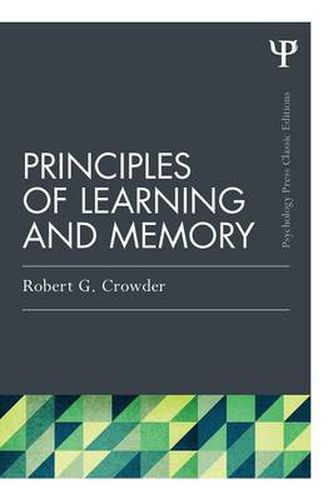Readings Newsletter
Become a Readings Member to make your shopping experience even easier.
Sign in or sign up for free!
You’re not far away from qualifying for FREE standard shipping within Australia
You’ve qualified for FREE standard shipping within Australia
The cart is loading…






In this landmark volume from 1976, Robert Crowder presents an organized review of the concepts that guide the study of learning and memory.
The basic organization of the book is theoretical, rather than historical or methodological, and there are four broad sections. The first is on coding in memory, and the relations between memory and vision, audition and speech. The second section focuses on short-term memory. The third is loosely organized around the topic of learning. The final section includes chapters that focus on the process of retrieval, with special attention to recognition and to serial organization.
Crowder presumes no prior knowledge of the subject matter on the part of the reader; technical terms are kept to a minimum, and he makes every effort to introduce them carefully when they first occur. It is suitable for advanced undergraduate and graduate courses.
$9.00 standard shipping within Australia
FREE standard shipping within Australia for orders over $100.00
Express & International shipping calculated at checkout
Stock availability can be subject to change without notice. We recommend calling the shop or contacting our online team to check availability of low stock items. Please see our Shopping Online page for more details.
In this landmark volume from 1976, Robert Crowder presents an organized review of the concepts that guide the study of learning and memory.
The basic organization of the book is theoretical, rather than historical or methodological, and there are four broad sections. The first is on coding in memory, and the relations between memory and vision, audition and speech. The second section focuses on short-term memory. The third is loosely organized around the topic of learning. The final section includes chapters that focus on the process of retrieval, with special attention to recognition and to serial organization.
Crowder presumes no prior knowledge of the subject matter on the part of the reader; technical terms are kept to a minimum, and he makes every effort to introduce them carefully when they first occur. It is suitable for advanced undergraduate and graduate courses.